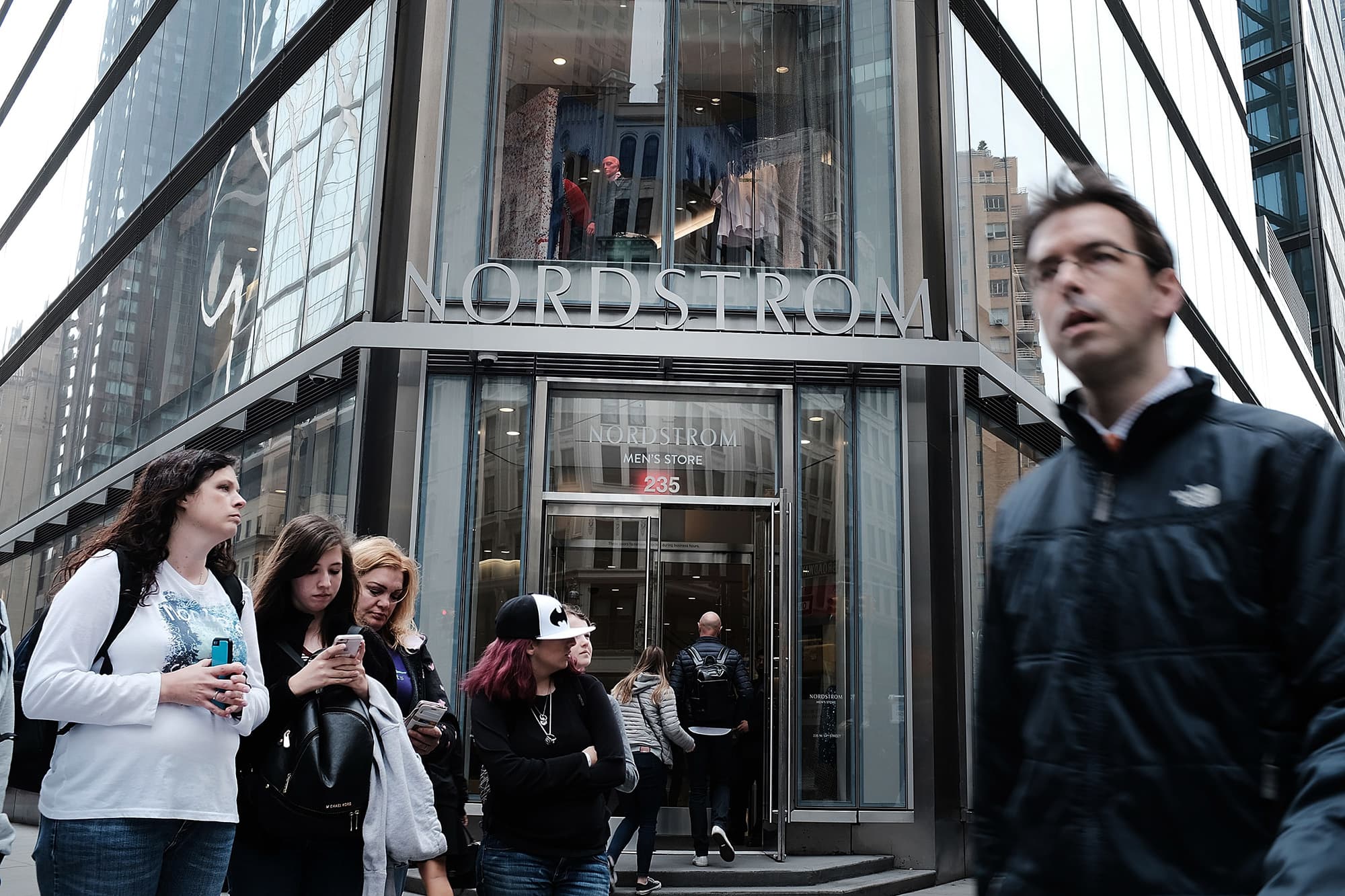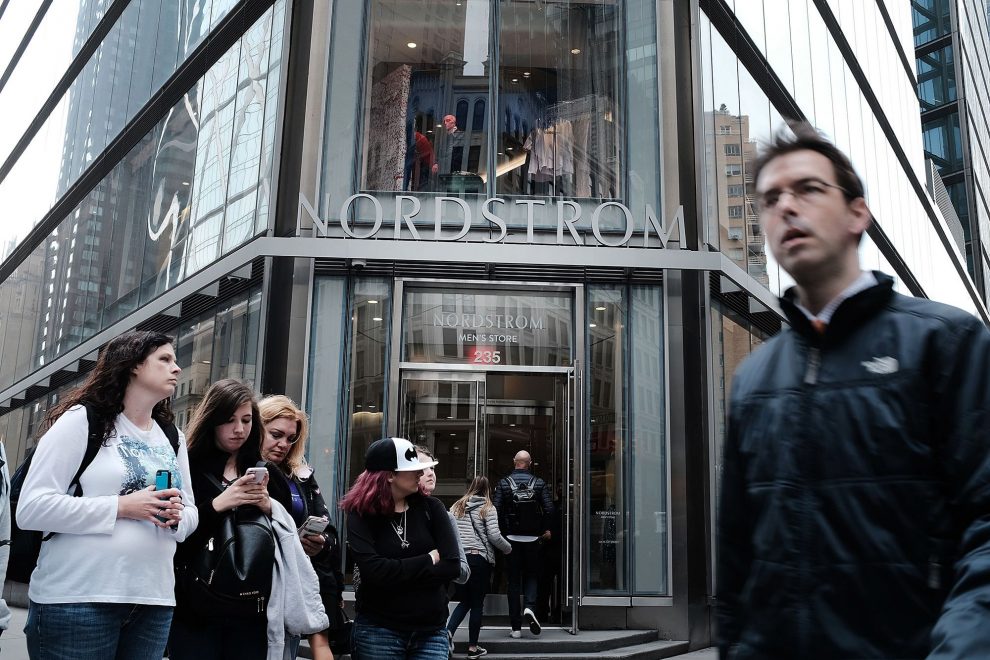
A slew of department store chains reported dismal first-quarter earnings on Tuesday, and the excuses for the bad reports were plentiful: a cooler start to the spring season, not having the right merchandise in stock and not having good enough promotions to draw shoppers in.
But the underlying issue remains: Department store operators haven’t figured out how to bring customers into stores, when more and more customers are opting to buy things online from places such as Amazon, Rent the Runway and Stitch Fix or are heading directly to brands such as Nike and Kate Spade, skipping a trip to the mall.
Nordstrom reported fiscal first-quarter earnings after market close Tuesday that missed analysts’ expectations, following similarly downbeat reports from Kohl’s and J.C. Penney earlier in the day.
The news sent Nordstrom shares tanking more than 11% in after-hours trading. That’s after shares of Kohl’s hit a new 52-week low and closed the day down more than 12%, and Penney’s stock dropped more than 7%. Shares of Macy’s were down more than 1% in after-hours trading, having closed the day up nearly 1%.
Nordstrom reported earnings of 23 cents a share, adjusted, on revenues of $3.44 billion. Analysts were expecting adjusted earnings of 43 cents per share on sales of $3.57 billion, based on Refinitiv data.
Nordstrom also slashed its profit expectations for the full year, as the company said it had “executional misses” with its shoppers to start 2019. The retailer said it now expects to earn between $3.25 and $3.73 per share, down from a prior range of $3.65 to $3.90 a share. It’s calling for net sales to be flat to down 2%, compared with a prior projection for growth between 1% to 2%.
Meanwhile, Penney’s net loss nearly doubled during its fiscal first quarter, while Kohl’s missed same-store sales expectations for the first time in two years.
America’s department stores are still struggling, even as these retailers are working toward trimming their massive real-estate footprints, refreshing bricks-and-mortar stores with modern fixtures and adding more delivery options — all in hopes of wowing customers and winning sales.
Off-price chains such as TJ Maxx and Ross Stores have been stealing market share from department stores, as have Walmart and Target. These retailers are viewed as being more successful because their stores aren’t found in shopping malls and they promise good value for customers shopping on a budget.
As of Tuesday’s market close, Kohl’s shares are down about 15.5% from a year ago, Penney shares are down 57%, Macy’s shares are down 37%, and Nordstrom shares are down 17.5% over the past 12 months. The S&P 500 Retail ETF (XRT) has fallen just about 8% over the same period of time.
Kohl’s
Kohl’s missed earnings expectations for its fiscal first quarter and, like Nordstrom, slashed its outlook for the full year. The retailer’s tie-up with Amazon, where it’s been accepting Amazon returns at certain locations, hasn’t yet moved the needle on Kohl’s sales. But that returns program is going nationwide this summer, and Kohl’s said it expects to meaningfully boost foot traffic and hopefully sales.
Kohl’s reported adjusted earnings of 61 cents a share on sales of $4.09 billion. Analysts were calling for earnings per share of 68 cents on revenue of $3.94 billion, based on Refinitiv data.
Sales at Kohl’s stores open for at least 12 months fell 3.4%, while analysts were calling for a drop of just 0.2%.
Kohl’s said it now expects adjusted earnings per share to fall within a range of $5.15 to $5.45, compared with an earlier estimate of $5.80 to $6.15. Analysts had been calling for earnings of $6.04 per share.
CEO Michelle Gass said the year “started off slower than we’d like.” She said Kohl’s home-goods business underwhelmed, as a cooler, wetter start to spring hurt sales of spring goods. But she called these “temporary” issues.
J.C. Penney
Penney also missed Wall Street’s earnings and same-store sales estimates. The company attributed a drop in sales to its decision in February to halt selling appliances in stores. CEO Jill Soltau said the company is “working to reestablish the fundamentals of retail.” But she didn’t offer many details during a call with analysts about how exactly it plans to do that.
Soltau has been building out Penney’s executive leadership bench, though, and Tuesday the company announced it’s hired Shawn Gensch from grocery chain Sprouts Farmers Market to be chief customer officer and executive vice president. Penney is still looking to hire a head of e-commerce.
Penney reported a net loss of 46 cents per share on sales of $2.56 million. Analysts were calling for a net loss of 38 cents a share on sales of $2.56 million.
Penney’s same-store sales dropped 5.5%, worse than an expected drop of 4.2%.
“Looking ahead, our main concern is not that CEO Jill Soltau will fail to take action nor that she will make the right decisions, but that the company will run out of time and capital to make the necessary changes,” GlobalData Retail Managing Director Neil Saunders said. “J.C. Penney is a very weak operator in one of the toughest sectors of a highly competitive retail market in an era of more subdued demand from highly fickle consumers.”
Nordstrom
Nordstrom, wrapping up the day, said sales at its full-price department stores dropped 5.1% during the latest quarter, while net sales at its off-price Nordstrom Rack locations were down 0.6% from a year ago.
It said its e-commerce sales were up 7% and now represent 31% of total sales, compared with 28% a year ago.
Management on a call with analysts said Nordstrom pulled back on promotional events during the quarter — an attempt to improve profitability — but that plan ultimately backfired. Nordstrom is hoping that making a big splash in New York later this year, with its first women’s store in Manhattan, will help revive momentum around the brand.
While the results from Nordstrom, Penney and Kohl’s aren’t as strong of those of Macy’s, which just last week crushed Wall Street estimates, Macy’s sales during its fiscal first quarter still were down from a year earlier. The department store operator is still looking for ways to refresh its bricks-and-mortar stores to keep them exciting for customers, just like its rivals. Not one of these retailers is in the clear.
All of these department store chains also have the threat of additional tariffs on footwear and apparel hanging over them. The White House is still considering new 25% tariffs on roughly $300 billion of goods from China, including clothing.
The 25% tariffs would have a significant impact on Penney’s in-house brands, Soltau told analysts Tuesday on a post-earnings conference call. Gass called it a “very fluid situation.”









